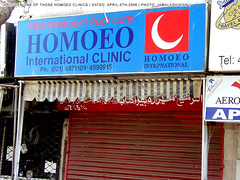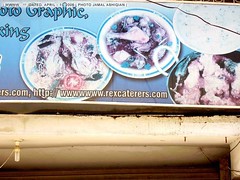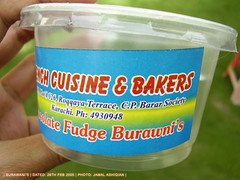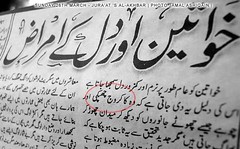Adil Najam
A couple of people have emailed to remind me that we have not had a post on Pinglish for a while. Maybe I got scared by sabizak’s reminder (here) that I should be more careful in my determination of what is or is not Pinglish. Must confess that I am still not sure what it is, even thought I offered a provisional definition of Pinglish (here); of course, this is very closely related to Hinglish. (More Pinglish posts here).
So, off I went in search of a better understanding of this thing I was calling Pinglish. What I found – hidden deep inside the crevasses of the Internet – was a delightful post on a forum called CyberMurid by someone going by the name bandali under the title ‘Pinglish, Urdish or Engdu.’ (Addition: Although I had originally found this material at the said website, we have since been informed that much of this material was part of an articel by Dr. Rauf Parikh in Dawn magazine, March 10, 2002.)
Here are the ‘techical essentials’:
A prominent feature of ‘Pinglish’ in the use of obsolete (in some cases even archaic) words and expressions. Local coinage is quite common. In some cases, this local coinage, though it may occasionally sound legitimate, would be incomprehensible or even hilarious to native ears. Sometimes, the local variety of the language sounds bookish (they ‘felicitate’, they don’t ‘congratulate’), too formal (‘do the needful’, for instance) or even ‘Un-English’. Many terms and phrases used in this part of the world are not part of the English language but have rather been ‘concocted’ and packed in a phrase-like expression. For example: pin-drop silence, cousin-brother, cutpiece and out of station (away from one’s home town). Grammatical liberties are quite interesting and pronunciation poles apart from what is known as RP (received pronunciation).
The writer goes on to give a hilarious list of examples. many of these are not ‘wrong,’ they are things that you will hear in Pakistan but those outside of our region may not understand them the way we do. Let me just share a few:
 ‘What is your good name’?
‘What is your good name’?
This may sound strange to the native ears since this is literal translation of ‘Ism-i-sharif’ in Urdu.
‘How is your good self?’
This also has a ring of Urdu. Perhaps ‘mizaj sharif’ translated.
Hotel:
It refers to an eatery as well as to any place meant for boarding and lodging. [ATP: Many of us still say ‘hotal meiN khana khana’ when we really mean restaurant].
Colony:
Forget colonialism and imperialism; in ‘Pinglish’ this refers to a large area comprising of residential blocks, for instance: Jinnah Colony, People’s Colony, Shah Faisal Colony, etc.
Cheater:
Used in colloquial Urdu (and local ‘English’, too) instead of ‘cheat’.
Bearer:
A waiter.
Affectee:
In desi English this means ‘someone affected,’ but it is not to be found in the dictionary (English dictionary, that is).
Cent percent:
Used instead of ‘a hundred per cent’ (‘per’ and ‘cent’ are put together).
Moot:
Used by some local newspapers instead of ‘meeting’.
Optical:
Used (especially by shops) in place of ‘eye glasses’.
Nullah:
Ravine; usually buses fall into ‘nullahs’ and ‘khuds’.
Dacoit:
A robber, perhaps from Urdu dakait.
Cutpiece:
A small, leftover piece of cloth; a local coinage. [ATP: See our ganderi discussion here and here].
Diggy:
The trunk of a car.
Black money:
Refers to money amassed through unfair means; another local usage, perhaps a literal translation of kala dhan
Toast:
A slice of bread whether toasted or not.
Kutcha:
Made of mud or clay, for example, a kutcha road, a kutcha house. Antonym is pucca.
Peon:
The dictionary says peon means a day-labourer; in India it meant a foot-soldier. But now, in Pakistan and India, it means ‘a messenger or office boy’.
 Eve-teasing:
Eve-teasing:
Sexual harassment.
Keep fast:
Instead of ‘fast’ (for roza); literal translation from Urdu.
Give exam:
Instead of ‘take exam’; literal translation from Urdu.
New, new things:
Literal translation from Urdu involving repetition of adjectives, such as ‘big, big cars’.
All of the original post if very well written and, importantly, is not trying to poke fingers at anyone:
This scribe is very much part of the mundane majority of Pakistanis that uses desi
At a more substantive level, bandali offers this useful and informative analysis:
Some linguists believe that a kind of ‘indigenization’ does occur when the speakers of other languages use a particular language and, according to them, when a language is used as a foreign language some ‘deviation’ may take place (because of the local milieu) and this ‘deviation’ should not be termed as a ‘mistake’. Rather, linguists like to refer to such versions as ‘regional variety’.
I do agree with this point of view, but in the case of desi English, they are not deviations or even mistakes; sometimes these are downright atrocities. I feel that if somebody wants to take revenge on the British for what they did to us during the British Raj, they should think of some other and better ways – for instance, ‘exporting’ some of our politicians to the UK for good (it will, in turn, benefit our country as well).
Some linguists, Dr Tariq Rehman, for instance, are of the view that Pakistani English is the new regional variety of the language and, therefore, should be viewed as such; i.e., something like South-Asian English or African English. This may be true, but in some instances, the ‘Urduization’ of English reaches such lengths that it sounds something like ‘Urdish’ or ‘Engdu’.
P.S. I have been unable to locate bandali and this writeup was originally posted on CyberMurid in March 2002; If someone knows who bandali is please convey to him (I assume it is ‘him’ from the name) that he has fans at ATP.
P.P.S. The photographs are from Jamsh; look at them carefully and enjoy. His photo collection is at Flickr.com and who blogs here. More Pinglish posts here.
P.P.P.S. Since having posted this, we have been informed that much of the material we had found on the CyberMurid website (now no longer functional) was part of an article by Dr. Rauf Parih in Dawn magazine (March 10, 2002).






















































While here in the West we talk about Hinglish and Pinglish.In UAE and other parts of the Gulf,they have universally adopted what is now called “Hindustani” which is Urdu and Hindi combined.
So approaching the immigration desk at Dubai Airport or negotiating with the traffic police there,feel free to speak your language whther Urdu or Hindi,they would understand you very well.
very interesting adil:)
here is an addition
issues as in how many issues you have – the first time an uncle/auntie type asked me this i started organisisng a list in my mind – the faujis, population control, hiv-aids, terrorism –
only later i discovered they wanted to find out how many children i have!
and a digression:
a shop sign in sadar says finest loose tea –
i asked my companion when are we having some ayyash chai? – won’t share what she said;)
Its been over 14 years since I left Pakistan as an 11 year old but whevever I am talking to a customer service person on the phone here, I always find myself using the pharase “What is your good name please?” I guess old habits don’t go away that easily. I don’t recall using this line that often in Pakistan but had heard it enough to compile it in my english grammer.
bravo
excellent entry. this had me cracking up all the way through.
jeevay pinglish
Tow more words that come to mind:
Gunman (usually pronounced as gun man): In English it means a professional killer. In Pinglish it is used for armed gurds.
On ( pronounced as Own): Used as nonun, mostly by car dealers for the amount of money paid over and above the announced or official price of a car.
Adil,
I agree with Mus’s suggestion to increase the font size of comments, that is, if you don’t want us to change our “Opticals” too often.